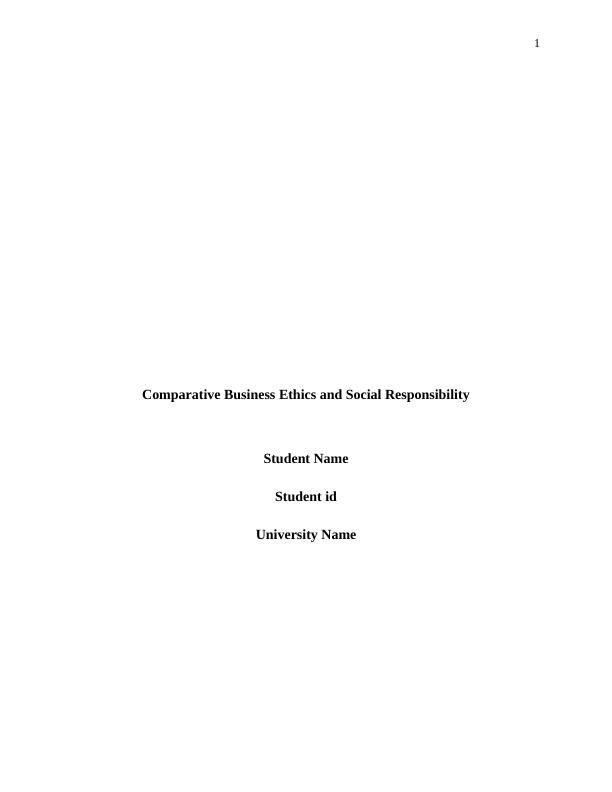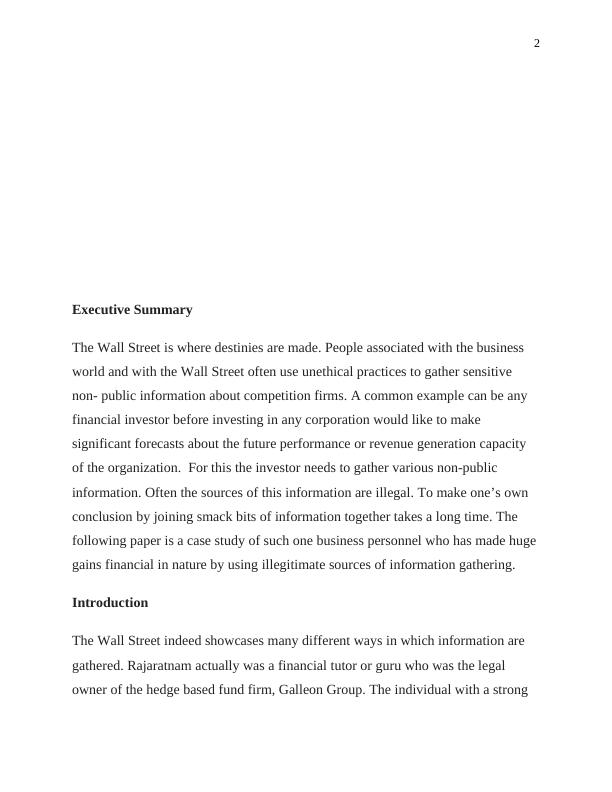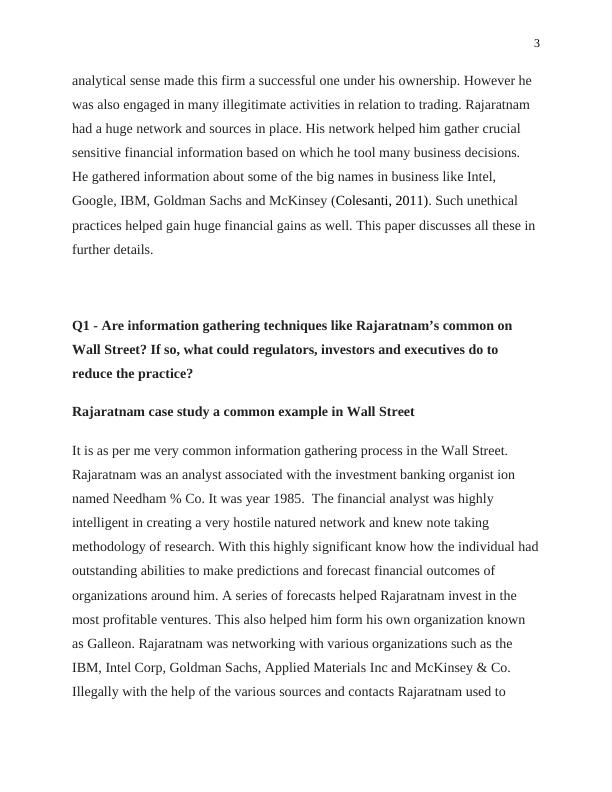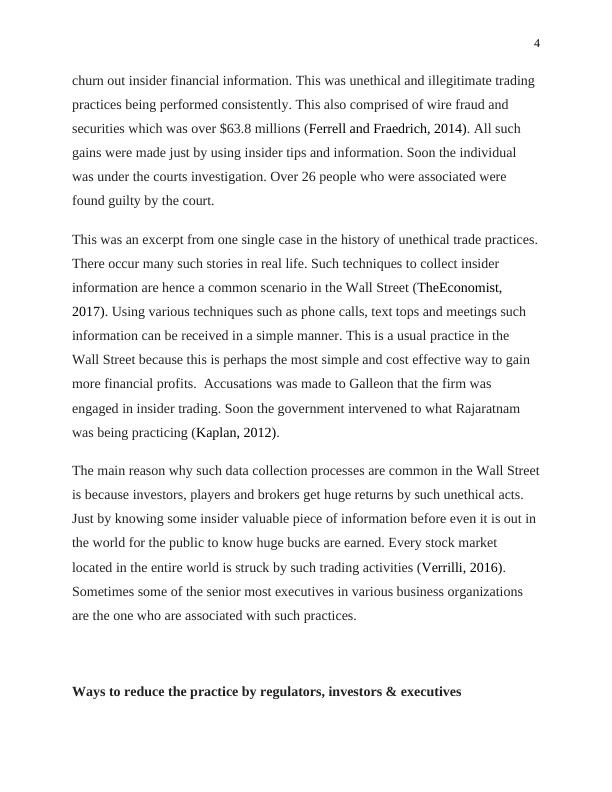Comparative Business Ethics and Social Responsibility: Case Study
Added on 2020-03-28
16 Pages4054 Words81 Views
1Comparative Business Ethics and Social ResponsibilityStudent NameStudent idUniversity Name

2Executive SummaryThe Wall Street is where destinies are made. People associated with the business world and with the Wall Street often use unethical practices to gather sensitive non- public information about competition firms. A common example can be any financial investor before investing in any corporation would like to make significant forecasts about the future performance or revenue generation capacity of the organization. For this the investor needs to gather various non-public information. Often the sources of this information are illegal. To make one’s own conclusion by joining smack bits of information together takes a long time. The following paper is a case study of such one business personnel who has made huge gains financial in nature by using illegitimate sources of information gathering. IntroductionThe Wall Street indeed showcases many different ways in which information are gathered. Rajaratnam actually was a financial tutor or guru who was the legal owner of the hedge based fund firm, Galleon Group. The individual with a strong

3analytical sense made this firm a successful one under his ownership. However he was also engaged in many illegitimate activities in relation to trading. Rajaratnam had a huge network and sources in place. His network helped him gather crucial sensitive financial information based on which he tool many business decisions. He gathered information about some of the big names in business like Intel, Google, IBM, Goldman Sachs and McKinsey (Colesanti, 2011). Such unethical practices helped gain huge financial gains as well. This paper discusses all these in further details.Q1 - Are information gathering techniques like Rajaratnam’s common on Wall Street? If so, what could regulators, investors and executives do to reduce the practice? Rajaratnam case study a common example in Wall StreetIt is as per me very common information gathering process in the Wall Street. Rajaratnam was an analyst associated with the investment banking organist ion named Needham % Co. It was year 1985. The financial analyst was highly intelligent in creating a very hostile natured network and knew note taking methodology of research. With this highly significant know how the individual hadoutstanding abilities to make predictions and forecast financial outcomes of organizations around him. A series of forecasts helped Rajaratnam invest in the most profitable ventures. This also helped him form his own organization known as Galleon. Rajaratnam was networking with various organizations such as the IBM, Intel Corp, Goldman Sachs, Applied Materials Inc and McKinsey & Co. Illegally with the help of the various sources and contacts Rajaratnam used to

4churn out insider financial information. This was unethical and illegitimate trading practices being performed consistently. This also comprised of wire fraud and securities which was over $63.8 millions (Ferrell and Fraedrich, 2014). All such gains were made just by using insider tips and information. Soon the individual was under the courts investigation. Over 26 people who were associated were found guilty by the court.This was an excerpt from one single case in the history of unethical trade practices.There occur many such stories in real life. Such techniques to collect insider information are hence a common scenario in the Wall Street (TheEconomist, 2017). Using various techniques such as phone calls, text tops and meetings such information can be received in a simple manner. This is a usual practice in the Wall Street because this is perhaps the most simple and cost effective way to gain more financial profits. Accusations was made to Galleon that the firm was engaged in insider trading. Soon the government intervened to what Rajaratnam was being practicing (Kaplan, 2012).The main reason why such data collection processes are common in the Wall Streetis because investors, players and brokers get huge returns by such unethical acts. Just by knowing some insider valuable piece of information before even it is out in the world for the public to know huge bucks are earned. Every stock market located in the entire world is struck by such trading activities (Verrilli, 2016). Sometimes some of the senior most executives in various business organizations are the one who are associated with such practices. Ways to reduce the practice by regulators, investors & executives

End of preview
Want to access all the pages? Upload your documents or become a member.
Related Documents
Comparative Business Ethics & Social Responsibility Assignmentlg...
|11
|3547
|280
Insider Trading in Galleon Groupslg...
|13
|4448
|288
HC2121 : Comparative Business Ethics and Social Responsibilitylg...
|12
|4181
|259
Comparative Business Ethic and Social Responsibilitylg...
|14
|4260
|139
The Comparative Business Ethics & Social Responsibilitylg...
|14
|3909
|38
Raj Rajaratnam's Unusual Lifestylelg...
|15
|4651
|321
